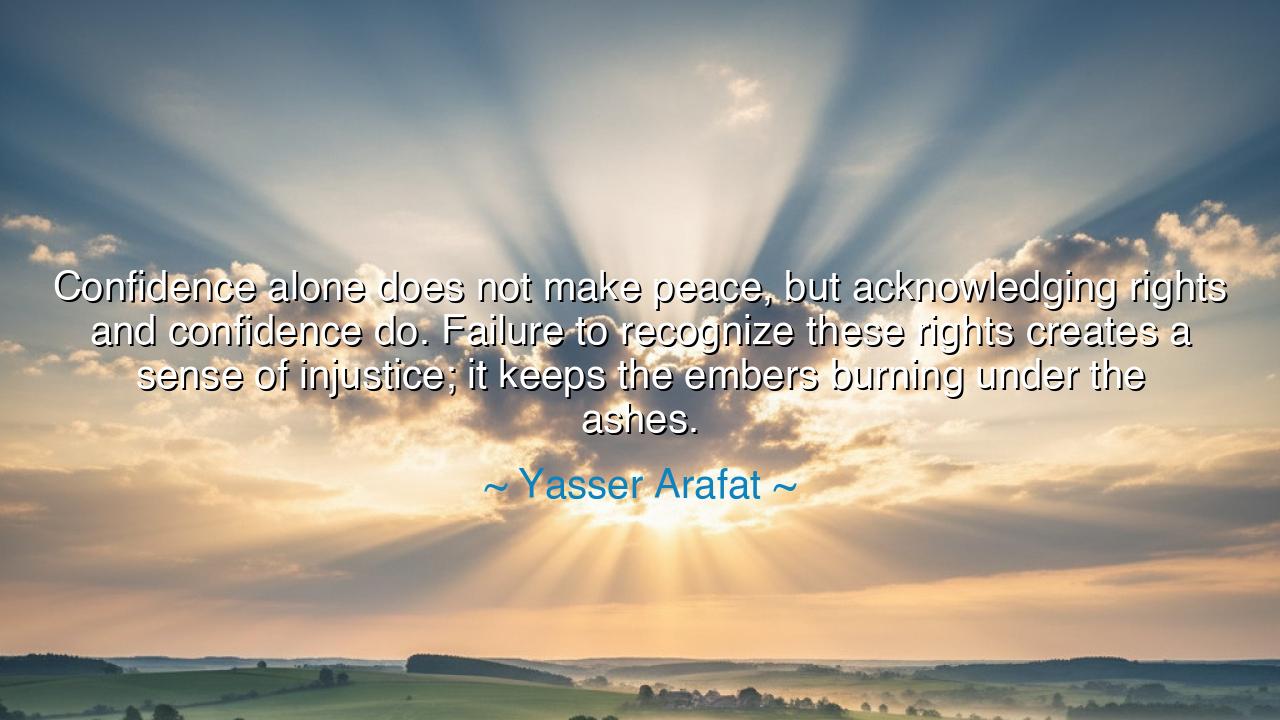
Confidence alone does not make peace, but acknowledging rights
Confidence alone does not make peace, but acknowledging rights and confidence do. Failure to recognize these rights creates a sense of injustice; it keeps the embers burning under the ashes.






The words of Yasser Arafat — “Confidence alone does not make peace, but acknowledging rights and confidence do. Failure to recognize these rights creates a sense of injustice; it keeps the embers burning under the ashes.” — resound like a truth forged in the crucible of struggle and history. They rise from the heart of conflict, yet speak not only to nations but to all humanity. In these words, Arafat, a man shaped by exile, resistance, and the dream of liberation, reveals the essence of true peace: that it is not born of power, nor of mere promises, but of justice — the recognition of the rights and dignity of every human soul. For where injustice is buried without repentance, it does not die; it smolders, waiting for the wind of remembrance to ignite it once more.
At first, Arafat’s statement seems political, bound to the realm of negotiations and treaties. Yet beneath it flows a universal truth about human nature and the laws that govern peace. Confidence — trust — is necessary, yes, but fragile. Without the firm foundation of justice, it collapses like a house built upon sand. A handshake between enemies means little if beneath it lie broken promises and unacknowledged wounds. Only when one recognizes the other’s rights — not as a favor, but as an equal truth — can the soil of peace begin to bear fruit. For peace, as Arafat reminds us, is not the silence of weapons, but the harmony of fairness.
The image he gives — of “embers burning under the ashes” — is both poetic and prophetic. It speaks of the unseen fires that smolder within oppressed hearts, long after the noise of battle has ceased. History has shown this countless times. The Treaty of Versailles, which ended the First World War, imposed punishment without justice, humiliation without healing. The victors rejoiced in confidence, but they did not acknowledge the rights or humanity of the defeated. And so, beneath the ashes of that uneasy peace, the embers of resentment glowed — until, two decades later, they burst into the flames of the Second World War. Thus, Arafat’s warning echoes through time: without justice, peace is an illusion.
The wisdom of this truth can also be found in the lives of those who sought peace through understanding rather than dominance. Consider Nelson Mandela, who, after decades of imprisonment, emerged not with vengeance but with vision. He knew that confidence between peoples could not stand unless the rights of the oppressed were acknowledged. In South Africa, it was not enough to end apartheid; the nation had to confront its moral wounds through truth and reconciliation. Only by naming the injustice could the embers of anger cool and a new dawn rise. Mandela, like Arafat, understood that peace without recognition of human dignity is a mask worn by unrest.
But Arafat’s words carry another meaning, one that speaks not only to nations but to souls. In our personal lives, too, we often mistake quiet for peace — believing that the absence of argument means harmony. Yet if we fail to acknowledge the rights and feelings of others, if we silence rather than heal, we only bury the fire of resentment beneath the ashes of pretense. Whether in friendship, family, or love, unresolved wrongs do not fade; they fester. The same law that governs the peace of nations governs the peace of hearts: justice is the foundation of lasting harmony.
There is also in Arafat’s words a reflection of divine law — the moral order that binds all things. The prophets of old spoke of peace, but always as the fruit of righteousness. Peace without justice is false peace, a calm before the storm. Even in nature, balance is achieved not by dominance but by respect — by the recognition that each thing has its rightful place. When one element overpowers another, destruction follows. Thus, the philosopher’s truth and the mystic’s insight converge with Arafat’s political wisdom: only by acknowledging the rightful order of things can harmony endure.
The lesson, then, is eternal: if you seek peace — in your home, in your community, in your world — begin with justice. Do not seek merely to quiet conflict; seek to understand and to restore balance. Do not build peace upon forgetfulness, but upon truth. Speak not of reconciliation until you have looked into the eyes of the wronged and said, “I see you, and your suffering is real.” For every ignored injustice is an ember waiting for breath. To extinguish it, one must bring light — the light of acknowledgment, of empathy, of fairness.
So, O seeker of wisdom, heed the counsel of Arafat’s words. Let your peace be founded not in comfort, but in courage — the courage to face what is unjust and to make it right. Whether among nations or within your own soul, remember: confidence alone is not peace, and silence is not harmony. Only when the rights of all are honored, only when the wounded are heard, does peace descend like rain upon scorched earth — cooling the embers, cleansing the ashes, and allowing new life to rise from what was once burned.






AAdministratorAdministrator
Welcome, honored guests. Please leave a comment, we will respond soon